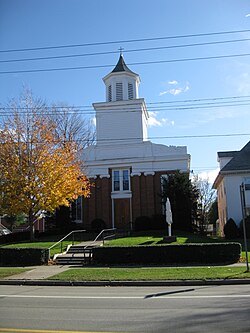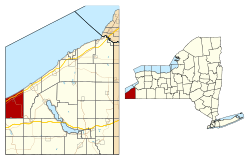Demographics
Historical population| Census | Pop. | Note | %± |
|---|
| 1820 | 1,111 | | — |
|---|
| 1830 | 1,647 | | 48.2% |
|---|
| 1840 | 2,197 | | 33.4% |
|---|
| 1850 | 1,732 | | −21.2% |
|---|
| 1860 | 2,013 | | 16.2% |
|---|
| 1870 | 1,946 | | −3.3% |
|---|
| 1880 | 1,990 | | 2.3% |
|---|
| 1890 | 2,020 | | 1.5% |
|---|
| 1900 | 2,256 | | 11.7% |
|---|
| 1910 | 2,239 | | −0.8% |
|---|
| 1920 | 2,116 | | −5.5% |
|---|
| 1930 | 2,254 | | 6.5% |
|---|
| 1940 | 2,250 | | −0.2% |
|---|
| 1950 | 2,694 | | 19.7% |
|---|
| 1960 | 2,848 | | 5.7% |
|---|
| 1970 | 2,934 | | 3.0% |
|---|
| 1980 | 3,181 | | 8.4% |
|---|
| 1990 | 2,967 | | −6.7% |
|---|
| 2000 | 2,636 | | −11.2% |
|---|
| 2010 | 2,415 | | −8.4% |
|---|
| 2020 | 2,310 | | −4.3% |
|---|
| 2021 (est.) | 2,292 | [2] | −0.8% |
|---|
|
As of the census of 2000, there were 2,636 people, 1,004 households, and 722 families residing in the town. The population density was 53.9 inhabitants per square mile (20.8/km2). There were 1,211 housing units at an average density of 9.6 persons/km2 (24.7 persons/sq mi). The racial makeup of the town was 98.25% White, 0.19% African American, 0.11% Native American, 0.08% Asian, 0.04% Pacific Islander, 0.34% from other races, and 0.99% from two or more races. 1.44% of the population were Hispanic or Latino of any race.
There were 1,004 households, out of which 33.0% had children under the age of 18 living with them, 57.8% were married couples living together, 7.7% have a woman whose husband does not live with her, and 28.0% were non-families. 23.4% of all households were made up of individuals, and 11.6% had someone living alone who was 65 years of age or older. The average household size was 2.63 and the average family size was 3.08.
In the town, the population was spread out, with 26.5% under the age of 18, 8.6% from 18 to 24, 27.4% from 25 to 44, 22.5% from 45 to 64, and 15.0% who were 65 years of age or older. The median age was 38 years. For every 100 females, there were 103.7 males. For every 100 females age 18 and over, there were 98.1 males.
The median income for a household in the town was $33,237, and the median income for a family was $37,083. Males had a median income of $28,278 versus $23,359 for females. The per capita income for the town was $15,652. 10.3% of the population and 7.8% of families were below the poverty line. Out of the total people living in poverty, 12.1% are under the age of 18 and 9.9% are 65 or older.
This page is based on this
Wikipedia article Text is available under the
CC BY-SA 4.0 license; additional terms may apply.
Images, videos and audio are available under their respective licenses.





